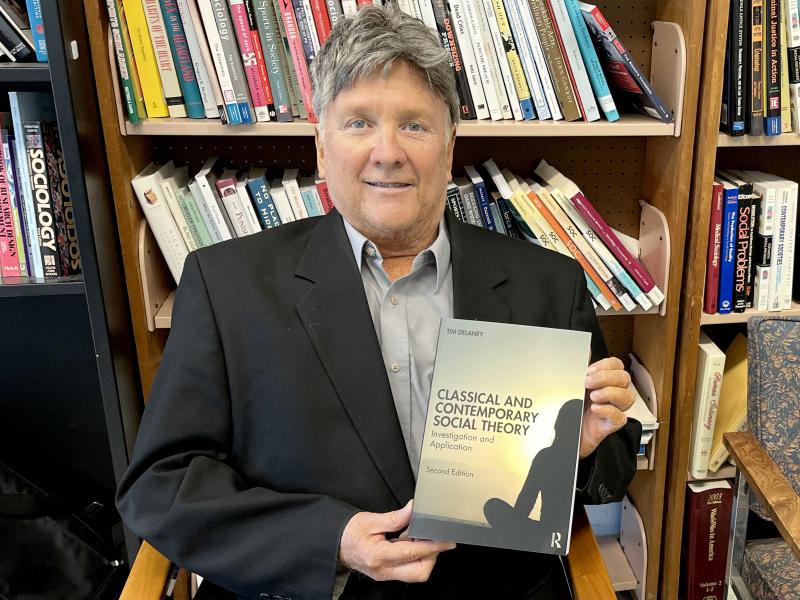The professor’s updated social theory book covers 500 years of key concepts

In his second, comprehensively updated edition of Classical and Contemporary Social Thought: Investigation and Application, sociology professor Tim Delaney examines five centuries of how people have explored and attempted to improve society.
He was asked by the major academic and professional publisher Routledge to produce an updated edition of his widely read 2014 textbook. The publication covers 500 years of social thought, stretching back to the time before sociology existed as a field of study and was considered more of an area of philosophy, covering classical social theorists and influential contemporary schools of sociological thought.
“From one edition to the next, many books contain only about 10 percent new material,” Delaney said. “This textbook is more than half new material. The structure of the chapters is mostly the same, but each chapter contains a lot of new content.”
The main sections consist of a Part I dealing with classical social thought, a Part II dealing with contemporary social thought, and a short Part III analyzing all 500 years.
He noted that in some courses the textbook is used for the two different lectures on classical and contemporary social theorists, while in other courses it is used for most of the entire 500-year period.
In developing the new edition, Delaney has included some additional thinkers to expand the book’s coverage of the field and incorporated new ways of describing important concepts. He has added newer relevant topics such as critical race theory, the #MeToo movement, and Black Lives Matter to underscore sociological concepts. He also uses a more intersectional lens to better present a broader view.
A bridge between eras
One difference from the original edition is that the influential and popular WEB Du Bois was not included, as his time frame was between the classical and contemporary eras. The updated edition includes Du Bois and some contemporaries in a chapter that serves as a sort of bridge between the two main parts.
The new chapter, “Growing Diversity in American Sociological Theory: Lester Frank Ward, Thorstein Veblen, and WEB Du Bois,” also addresses gaps in traditional texts.
“Ward is considered the first American sociologist,” Delaney explained. “It’s a shame he’s not better known because he had some very influential ideas.”
Peer reviewers responded very positively to this addition, and Delaney believes other readers would too.
“The reviewers have been absolutely delighted,” Delaney said of the new chapter. “This is an important transitional phase from classical to contemporary sociology. It fits in really well.”
In addition, he expanded a chapter that previously focused on postmodernism to include more content on structuralism, poststructuralism, globalization theory, colonialism, and postcolonialism.
From the past to the future
“It’s pretty cool because it covers about 500 years of social theory,” Delaney said. “It also addresses the question of where we see the beginning of the split from pure philosophy to what we know today as social theory. People more or less quote Machiavelli’s ‘The Prince’ from 1513 because he talks about society as it was rather than as it should be.”
Nevertheless, the field of sociology would not really develop until almost 300 years later.
It was the 19th-century scholar Auguste Comte who first coined the term “sociology,” and Delaney points out that a field cannot practically exist until it has a name and established parameters.
“Sociology is really about what is happening, what should be happening and what we can do to make people’s lives better,” Delaney explained.
Delaney noticed eight recurring themes that run through society’s history and run like a thread through the entire book:
- Belief in progress and cultural evolution
- Technological growth
- Coping with limited social and natural resources
- Overpopulation
- Capitalization, global community and globalization
- The importance of communication, language and the development of a universal language
- Role of religion in society
- Social injustice and power relations
“When you look at trends over 500 years, you identify and predict themes that will be important in the future because they keep coming up,” Delaney said. “By looking at such a long period of history, you are in some ways predicting the future.”
In this area, and especially on this topic with such a comprehensive perspective, there is not much competition in the textbook industry right now, Delaney said.
Additionally, the “application” of the book’s title is an important differentiator, as Delaney takes social theories and applies them to everyday examples that people can understand. “It’s important to show the relevance of these topics and update them so they remain relevant,” he said.
“This should be the leading theory book in this field,” Delaney said.



